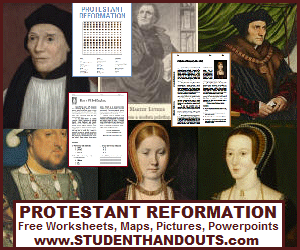 |
Protestant Reformation Educational Materials |
|---|
| www.studenthandouts.com > World History > Protestant Reformation |
|
The Protestant Reformation was a significant religious, political, and cultural movement that began in the early 16th century in Europe. It was a response to perceived abuses and corruption within the Roman Catholic Church and resulted in the fragmentation of Christianity into various Protestant denominations.
Background: By the 16th century, the Roman Catholic Church had become a powerful institution with considerable wealth and political influence. However, it was also facing criticism and internal problems, including corruption, the sale of indulgences (pardons for sins), and theological disputes. Martin Luther: The Reformation is often associated with Martin Luther, a German monk and theologian. In 1517, Luther famously posted his "95 Theses" on the door of the Castle Church in Wittenberg, Germany. These theses were a list of grievances against various practices of the Catholic Church, particularly the sale of indulgences. Theological Disputes: Luther's actions sparked intense theological debates. He argued that salvation came through faith alone (sola fide) and Scripture alone (sola scriptura), challenging the Catholic doctrine of justification through faith and good works. Luther's ideas were widely disseminated thanks to the recent invention of the printing press. Spread of Lutheranism: Lutheranism, Luther's theological movement, gained followers throughout Germany and beyond. Several princes and rulers supported the Lutheran cause, leading to the establishment of Lutheran state churches in various regions. Other Reformers: Luther was not the only reformer. Other figures, such as John Calvin in Geneva and Ulrich Zwingli in Switzerland, also played crucial roles in shaping the Reformation. They developed their own theological perspectives and established Reformed churches. Reformation Movements: The Reformation led to the emergence of various Protestant denominations, each with its own theological distinctives. These included Lutheranism, Calvinism (Reformed), Anglicanism (in England), and Anabaptism, among others. Political Implications: The Reformation had profound political consequences. Many rulers saw it as an opportunity to assert their independence from the authority of the Pope and the Catholic Church. Conflicts and wars, such as the German Peasants' War and the Thirty Years' War, were fought over religious and political issues. The Council of Trent: In response to the Reformation, the Catholic Church convened the Council of Trent (1545-1563), which addressed many of the issues raised by the reformers. The council reaffirmed traditional Catholic doctrines and practices while addressing some of the abuses that had sparked the Reformation. Religious Diversity: The Reformation led to religious diversity in Europe, with different regions adopting various forms of Protestantism or remaining Catholic. The religious landscape of Europe was forever altered. Impact on Education and Literacy: Protestant reformers emphasized education, leading to the establishment of schools and universities. This emphasis on education contributed to increased literacy rates in Protestant regions. Cultural and Artistic Changes: The Reformation had an impact on art, music, and culture. Protestant churches often featured simpler, more austere aesthetics in contrast to the elaborate Catholic art and architecture of the time. Long-Term Effects: The Reformation had long-term effects on the development of Western Christianity. It contributed to the rise of individualism, the spread of Protestantism to other parts of the world through colonization, and the establishment of various Protestant denominations that continue to exist today. The Protestant Reformation was a pivotal moment in European history, challenging the authority of the Catholic Church, promoting religious diversity, and laying the groundwork for the modern religious landscape in Europe and beyond. |
| www.studenthandouts.com > World History > Protestant Reformation |







